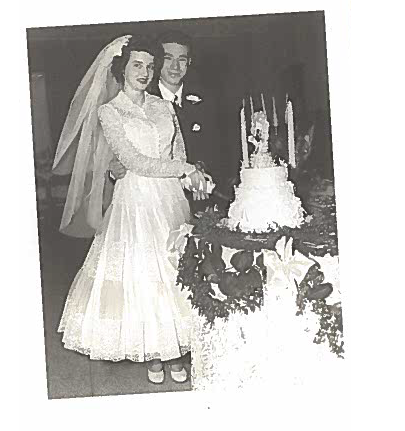AARP Hearing Center
Editor's Note: Dick's life in an ALF parallel's his wife's life in an Alzheimer's Facility. His feelings about his wife will appear for several weeks in his poems and essays.

I had come to visit Ginny. It was our fifty-seventh wedding anniversary.
I could still see that long-ago moment. We stood under the Chuppah. I raised my leg and stomped, shattering the glass from which Ginny and I had just sipped the wine of our wedded unity.
But at this moment, she sat stiffly in her lounge chair, at the end of the lineup of skinny old women and frail old men, slouched in their recliners in the community room of Lydia’s House Alzheimer’s Center. They looked at the fleeting images and heard the sounds of the soap operas flickering from the new forty-inch flat TV screen.
As I rolled my wheelchair past the residents, my eyes were fixed on Ginny. I stared hard at her face trying to determine if she, too, remembered that day; could still see us standing arm-through-arm before the open arc, the sanctuary of the Torah.
“Hi, Gin, it’s me.” No response. She stared into space.
“Me, Richie,” I said, trying again.
Nothing happened. She didn’t move. Her face didn’t change expression. She showed no awareness of my presence. I sighed under my breath, “Have you forgotten the sound of my voice?”
I moved my wheelchair closer to her recliner and whispered into her thin white hair, “Your Richie.”
I circled from side to side, inching closer, pleading with her to recognize my voice – to know who I was; to be aware of me. But Ginny, her memory of me lost, remained frozen, staring straight ahead. Finally, I twisted in my chair, bent over, faced her head-on, trying to make eye contact; but it was as if she looked through me. Her eyes were empty, staring at God knows what. Certainly, not me, as I shifted to try to place my eyes right in front of hers.
From within her white washed face – a whiteout of expression – her green eyes remained blank. Through the thick lenses of her glasses, her eyes were enlarged, misshapen, like the reflection in a funhouse mirror; distorted and engulfed by large purple, puffy circles.
As I circled around Ginny again, talking softly to her, telling her I love her, reminding her of our house, trying to make her remember walking with our dog, she dropped deeper into the recliner, leaned back against the faded, frayed, and stained maroon upholstery. Her legs popped up onto the equally faded, frayed, and stained footrest. In a futile gesture, my shoulders sagged in despair. Closing my eyes, I exhaled, blowing out a silent whisper of air. And I wondered. How many others have sunk down on this chair and lost themselves in their darkened minds?
Just then, the TV shouted, as a caregiver turned up the volume. It was Guiding Light. Or maybe General Hospital. Or was it As the World Turns. What difference did it make? Ivory Soap. Dawn. Spray & Clean. Ring-Around-the-Collar, all flashed by. Whatever! Nobody watched, anyhow. They sat like good little children in kindergarten, waiting for the afternoon movie. Like Ginny, they stare, lost in the meanderings of their non-functioning minds; or they sleep; some played with their stuffed teddy bears; some caressed cloth babies.
The movie started The hills are alive/with the sounds of music. As Julie Andrews sang, heads turned. Chins raised from chests. People were pulled out of daydreams. But Ginny stared straight and still. Her eyes glazed over, zombie-like, as the sounds of music slipped over her expressionless face.
“It’s still me, Richie,” I softly said, as I lightly touched her shoulder.
Her eyes shifted toward me. Her eyebrows raised. She must have recognized my voice this time. She moved her lips . . . I waited. I bent toward her, pulled as if by a magnet, closer; to hear her speak. . . “What….?” I hesitatingly pleaded.
Nothing came out.
No word.
Again I sagged. I was drained.
She squeezed her eyebrows. Frowned. Sucked in her lips. Widened her stare. Grunted. Her face twisted and tightened. She raised her hands and tried to stand. Sitting in my wheelchair, I felt my body trying to rise with her. She wanted to speak, but only emitted sounds from deep in her throat – “Arrgghh!” “Arrgghh!”
Then it was my turn to stare, to gaze at her twisted face, her widened eyes, her lips pressed hard together – her frustration straining to burst out. My chest pushing out with her.
I silently shouted: What’s in your mind? What are you trying to say?
I know you! You’re my Richie! I love you and have missed you!
Is that it? Is that what she’s saying? How can I tell if that’s what she’s thinking? By her angry face? Her pursed lips? Her guttural noises?
“Tell me,” my voice a husky whisper.
“ARRGGHH!!!”
I’ll never know.































































